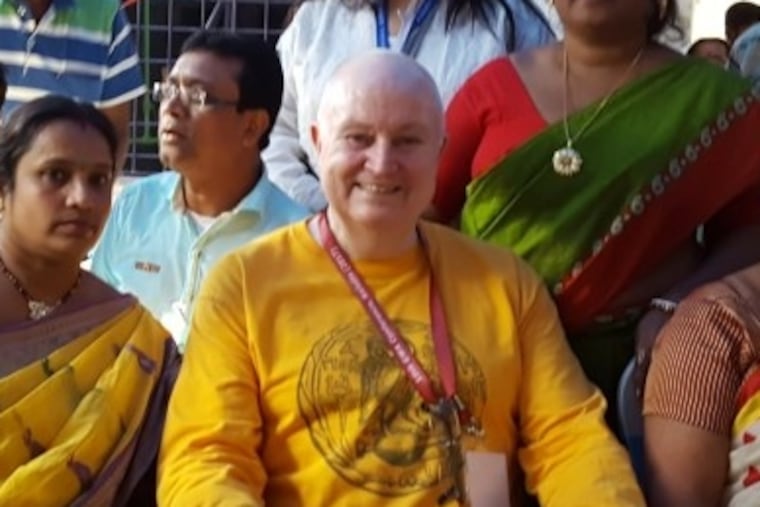Edward Grusheski, who helped restore Fairmount Water Works for environmental education, dies at 74
The national historic landmark is a center of interactive learning. Fairmount Water Works also has developed an environmental-science curriculum for Philadelphia public schools.

Edward F. Grusheski, 74, who was instrumental in making the once decrepit Fairmount Water Works a top attraction and center of environmental education, died Wednesday, Dec. 23, of colon cancer at his home in Philadelphia.
He came to the Philadelphia Water Department in 1988 to develop an interpretive center at the Fairmount Water Works, a project that grew from earlier philanthropic efforts to raise money to restore the 1815 engineering and design marvel that neighbors Boathouse Row along the Schuylkill. He also was a spokesman for the water department.
Mr. Grusheski cajoled a variety of government agencies and nonprofit organizations into backing the effort to create a place where the public could learn about water, urban watershed ecology, sustainability, art and architecture. The center opened in 2003.
“Ed jump-started it,” said Karen Young, executive director of the Fairmount Water Works. “He had a vision for what it could be. He was able to think beyond the structure, to the future of encouraging stewardship of our water source.”
The waterworks and the city water system were in Mr. Grusheski’s “fiber,” more than just a passionate cause, Young said.
“If you went to his home, and he loved to entertain, you would not be served bottled water,” said his friend Ron Hovey. “You’d get Philadelphia’s finest. And he’d tell how it was safer than bottled, which doesn’t have as many regulations on it — and no plastic goes into the ocean.”
Mr. Grusheski had an endless supply of his trademark bow ties. He traveled the world (often working with water-resources groups), collected fine art, and loved the orchestra. Once, on a trip to Italy, he chased down examples of Palladian architecture, which influenced the design of the Water Works, Hovey recalled.
Mr. Grusheski was born in Boston on May 2, 1946.
He graduated from the Boston Latin School in 1964 and earned his bachelor’s degree in 1968 at Georgetown University, along with classmate and friend Bill Clinton, friends and family said. Afterward, he served in the Army in Korea, translating and analyzing electronic communications. Later, in 1974, he earned a master’s degree in American civilization at the University of Pennsylvania.
Before his involvement with the waterworks, Mr. Grusheski was a curator and educator at the Boston Children’s Museum, the New Jersey State Museum in Trenton, Philadelphia’s old Civic Center Museum, and what is now called the Independence Seaport Museum, on Penn’s Landing.
He also had a dry sense of humor. In the early 2000s, a blood clot required Mr. Grusheski to have a leg amputated, Hovey said. He was fitted with a prosthetic.
Once, he and Hovey pulled up to 30th Street Station in a taxi. As Mr. Grusheski got out of the car, the prosthetic, which had loosened, went flying. Some people gasped. Some screamed.
“Oh dear, I lost my leg,” Mr. Grusheski deadpanned, according to Hovey.
He was on the boards of the Global Water Alliance and the Fund for the Water Works, and was the president of the Philadelphia-area chapter of the Society for Industrial Archeology. He also served on the planning committee of the Partnership for the Delaware Estuary.
Mr. Grusheski, who was an only child, leaves behind many beloved cousins and a circle of close friends. Many took turns sitting with and helping him when he began hospice care at home.
Christine Accas, a cousin who lives in Florida, said she felt blessed she was able to get to Philadelphia three days before Mr. Grusheski died.
“He was my brother-cousin. We grew up together,” Accas said. “He was a joy to be with, the most enthusiastic, optimistic person. That was his true spirit.”
Mr. Grusheski will be buried in his native Boston at a later date. Plans for a memorial service in Philadelphia are pending.
Donations in his memory may be made to Old St. Joseph’s Church, 321 Willings Alley, Philadelphia, Pa. 19106; or the Fairmount Water Works Interpretive Center, 640 Waterworks Dr., Philadelphia, Pa. 19130.